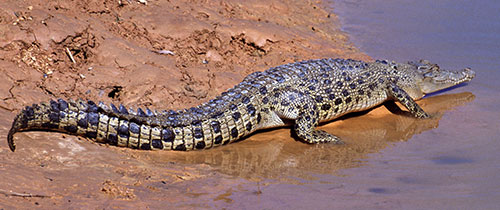Dangerous animal regulations (crocodiles): offences and fines
On this page
The Queensland Government is committed to balancing the highest possible levels of public safety with animal conservation in the wild by deterring people from engaging in dangerous or careless behaviours such as feeding, disturbing and interfering with crocodiles.
Monitoring has shown that feeding crocodiles increases the risk to public safety as it encourages the animals loiter around public places such as boat ramps, marinas, and tourist locations in search of food. Combined with habituation to humans, this can lead to changes in animal behaviour and is one of the main reasons for the removal of problem crocodiles outside active removal zones.
To deter people from doing the wrong thing, significant fines are in place with the courts also empowered to impose maximum punishments for high-risk actions such as blatant disregard of previous directions and/or repetitive unlawful behaviours.
Offences
Feeding or discarding of food/scraps
It is an offence to discard food (including fish frames, scraps and bait) in a way that may attract crocodiles to a public place such as a boat ramp, jetty, pontoon or camping area or park adjacent to water and where there is a sign warning of the presence of crocodiles in the vicinity.
The offence does not apply to food or scraps that are lawfully disposed of (e.g. at dedicated bins).
- On-the-spot fines of $483
- Maximum court-imposed fines of $6,676.
Remaining in close proximity to a crocodile on land
It is an offence to knowingly remain within close proximity to a crocodile that is on, or partly on, land. For example, it is an offence to remain in close proximity (10m) to a crocodile basking on a sandbar or riverbank.
This complements the ‘disturbing’ offence which prevents people, without a reasonable excuse, from approaching or pursuing a crocodile or driving a boat or vehicle within 10m of it.
Conservation officers also have the power to direct people to move away from a crocodile to avoid any potential human-crocodile interactions.
- On-the-spot fines of $806
- Maximum court-imposed fines of $ $16,690.
Deliberately disturbing or feeding crocodiles
- On-the-spot fines $2,670.
- Maximum court-imposed fines $27,539.
Interfering with a crocodile trap
- On-the-spot fines $2,670
- Maximum court-imposed fines $27,539.
Information for commercial operators
Discarding catch and scraps at a public place
Offences relating to discarding food/scraps (including fish frames, scraps and bait) at a public place (see definition above) also apply to commercial operators including those conducting commercial fishing and farming activities.
Catch, fish frames and scraps should only be disposed of away from a public place, preferably in waters with a current and always using a variety of different locations to avoid crocodile loitering around particular areas and becoming habituated.
Commercial operators should also wash vessels and equipment away from a public place.
If there is no alternative and these activities must be conducted at a public place, then the operator should take all reasonable attempts to collect scraps (fish frames, heads, bait) for correct disposal before washing smaller debris (scales and bodily fluids) from the vessel or equipment.
Remaining in close proximity to a crocodile on land or on water
Commercial operators conducting lawful activities as part of the ordinary course of their business, such as setting and collecting fishing equipment, can continue to do so even if these activities are in close proximity to a crocodile.
Reporting requirements
There is no requirement for commercial operators to report being in ‘close proximity’ to a crocodile to the Queensland Government.
If an estuarine crocodile is ‘accidently’ caught or taken during the course of a lawful activity, a commercial operator must report their interactions with the protected animal through the threatened, endangered and protected animal (TEP) logbook.
In circumstances where a crocodile is alive and the commercial fisher is unable to safely release the animal, they should contact 13 QGOV (13 74 68), press option 4, and ask for their local QPWS office.
Reporting an accidental catch or take of an estuarine crocodile also applies to all fisheries officers who are authorised officers under the Nature Conservation Act 1992.
